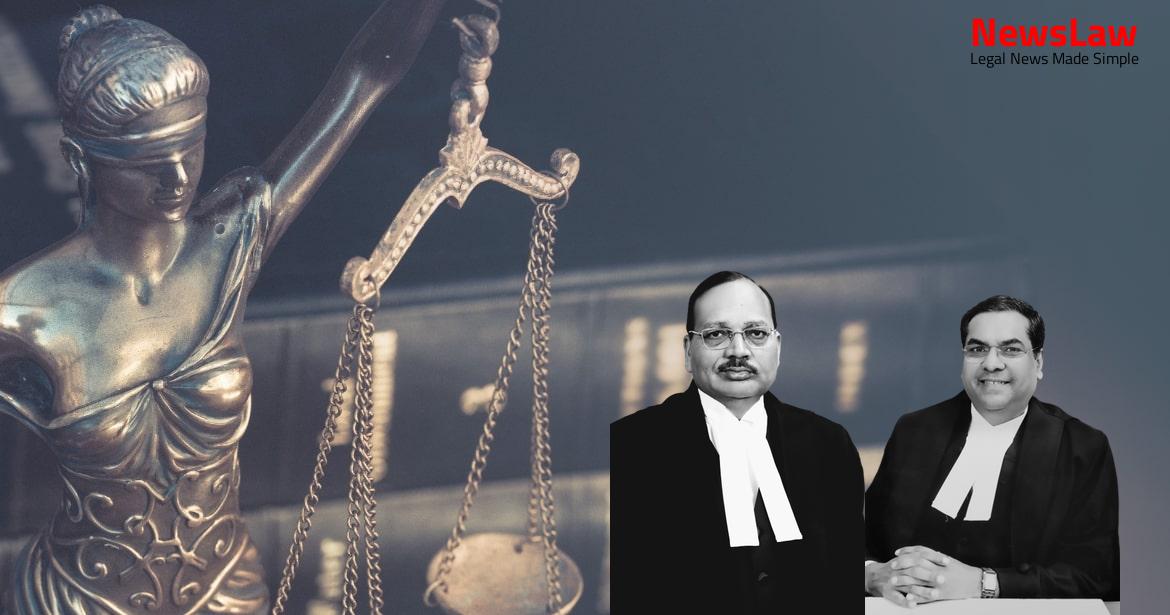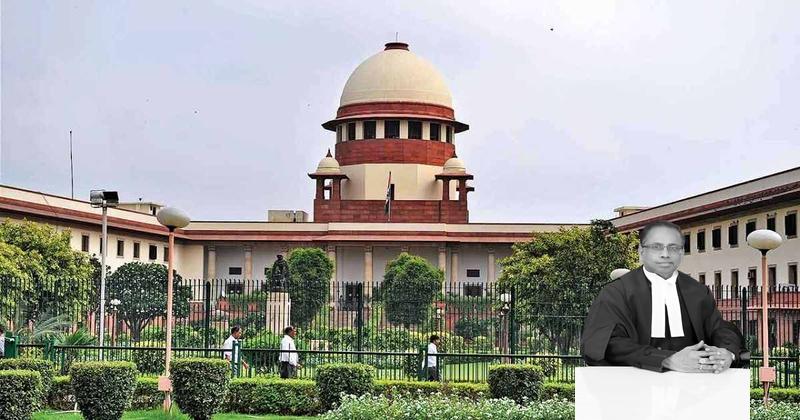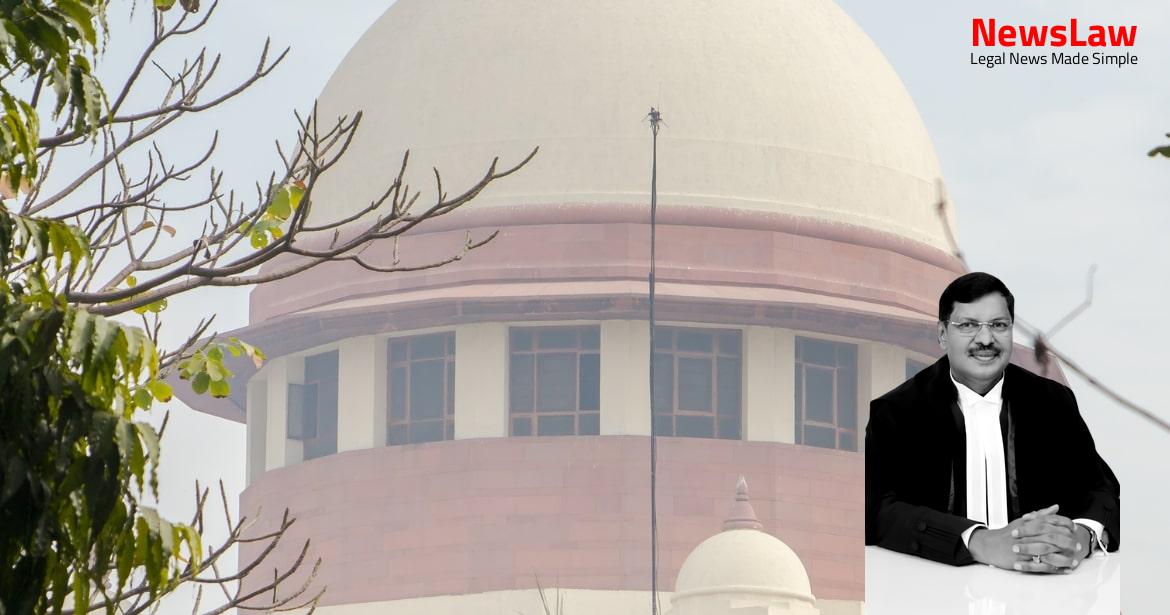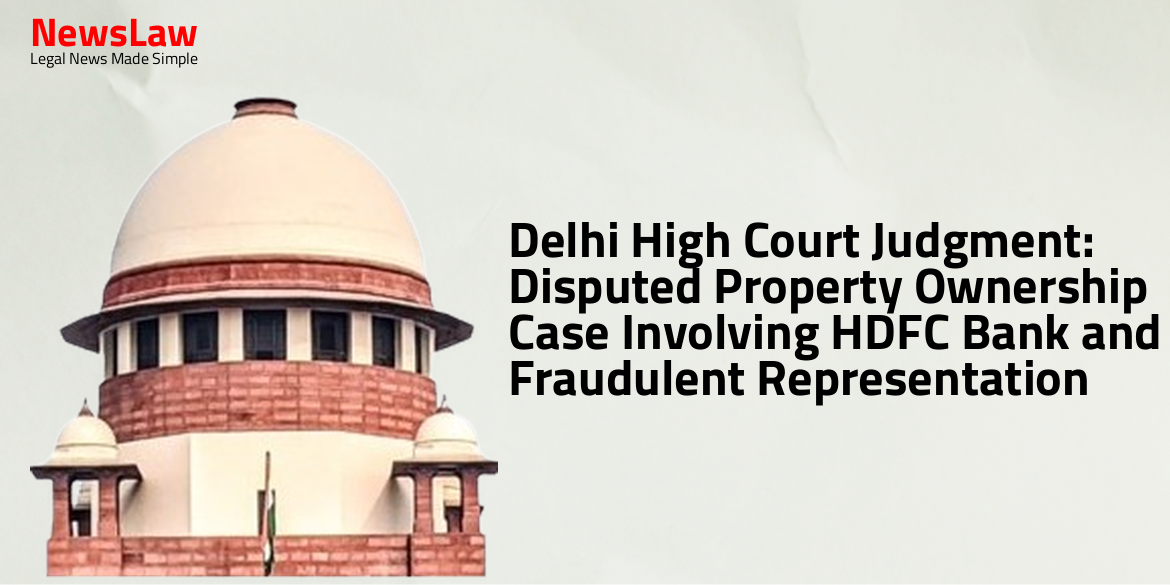Delve into the complexities of legal interpretation as the court navigates the application of the SEBI Circular in a Resolution Plan case. Discover the implications of retrospective versus retroactive application in this nuanced legal analysis.
Facts
- Debenture holders filed a suit on the Original Side of the Bombay High Court on 1 July 2021, urging Vistra to sign the ICA before considering the Resolution Plan.
- Debenture holders were to receive Rs. 91,00,000/- representing 29.96% of the total principal outstanding.
- Debenture holder parties to the suit had to accept negotiated settlement terms and transfer their debentures to the resolution applicant.
- RCFL, Bank of Baroda, and Vistra were not allowed to seek ex post facto consent from debenture holders for the ICA or the Resolution Plan.
- Resolution Plan terms included recovery percentages for various categories of lenders.
- Individuals/HUFs with debentures under Rs. 10 Lakhs to get 100% recovery, while those above Rs. 10 Lakhs would receive 24.96% of the principal.
- SEBI issued clarificatory letters in response to representation from Vistra and debenture holders, regarding compliance with circulars.
- SEBI entered appearance in response to an interlocutory application filed by debenture holders before the High Court.
- SEBI stated that debenture trustees must comply with its circulars even for defaults that occurred before the issuance of the circular.
- RCFL and Vistra amended the Debenture Trust Deeds in line with SEBI circulars.
- Resolution Plan by Authum Investment and Infrastructure Limited was approved by RCFL’s lenders on 15 July 2021.
- SEBI Circular does not govern the Debenture Trust Deeds and cannot operate retrospectively
- Vistra directed to conduct a meeting of all debenture holders in terms of the Debenture Trust Deeds
- Results of e-voting of the meeting held on 8 December 2021 to be placed on record
- SEBI Circular only applies to enforcement of security or entering into an ICA, not applicable in the present case
- The Supplementary Debenture Trust Deed makes the SEBI Circular applicable to defaults occurring after issuance or after 13 October 2020
- Dismissal of SEBI’s appeal by the Division Bench due to various reasons including SEBI not being a party to the suit and the need for negotiated settlements
Also Read: Balancing Power and Transparency: Electoral Bonds Struck Down, Disclosure Mandated
Issue
- Issues to be determined in the case are whether the debenture holders and other parties were required to follow the procedure under the SEBI Circular, and whether the civil court had jurisdiction to entertain the case.
- Submissions made by Mr. N Venkataraman in support of applying the SEBI Circular to the case include the existence of a Master Supplementary Debenture Trust Deed to align with the SEBI Circular.
Also Read: Recall of Resolution Plan Approval: Legal Analysis
Arguments
- Mr. Darius Khambata, representing RCFL, argued that the SEBI Circular does not have retroactive or retrospective application in the present case.
- Debenture holders would only constitute 21.02% of the total debt value if they joined the ICA along with lenders.
- SEBI’s argument that Sections 230 and 430 of the Companies Act exclude the High Court’s jurisdiction is deemed untenable as companies are not expressly barred from entering into compromise agreements with creditors.
- Mr. N Venkataraman, Additional Solicitor General, contended that the SEBI Circular operates retroactively as it does not affect vested rights but rather pertains to events preceding its issuance.
- The Circular mandates 100% repayment for debenture holders with exposures up to Rs. 10 lakhs.
- Mr. Khambata does not dispute certain legal principles upheld by the appellants, including the binding nature of SEBI Circulars, the necessity to follow prescribed procedures, non-waiver based on public policy, and prohibition of contracts against statutory provisions.
- Mr. Darius Khambata argued that applying the SEBI Circular to the case would render it retrospective, not retroactive.
- Mr. Dhruv Mehta, representing Authum, stated that any change to the resolution process under the RBI framework would disrupt stakeholders’ efforts.
- Three Debenture Trust Deeds were signed between RCFL and Vistra on different dates in 2017 and 2018.
- Defaults by RCFL began in March 2019, affecting all creditors, including retail debenture holders.
- Mr. KV Viswanathan argued against interference with the impugned order, stating that the SEBI Circular is not retrospective or retroactive.
- Authum is not a party to the proceedings, and Mr. Mehta contended that the SEBI Circular should only apply prospectively.
- It was suggested that the court, after determining the correct legal position, may use its discretion under Article 136 of the Constitution to shape the final relief based on equitable considerations.
- Overview of contractual arrangements including Debenture Trust Deeds and the compromise under the Resolution Plan not breaching relevant sections of the Companies Act, 2013.
Analysis
- The SEBI Circular stipulates the requirement of consent of a heightened majority of not less than 75% by value and 60% by number of investors at the ISIN level.
- The Resolution Plan under the RBI Circular cannot exist without an Inter-Creditor Agreement (ICA).
- The SEBI Circular facilitates the process of seeking consent for enforcement of security and/or entering into an ICA.
- Debenture trustees must follow the process outlined in the SEBI Circular during default situations, including seeking consent of investors for refraining from enforcing security or entering into an ICA.
- The SEBI Circular imposes a higher voting threshold of 60% by number and 75% to bind dissenting/abstaining debenture holders.
- Clause 6 of the SEBI Circular acknowledges that the Resolution Plan in the ICA may involve the restructuring of debt security, requiring consent of investors.
- Debenture holders may opt for alternative mechanisms other than signing an ICA, but compliance with SEBI Circular conditions is necessary if opting for a Resolution Plan involving lenders.
- Voting at the ISIN level enables single ISIN numbers to impact the outcome of a Resolution Plan.
- Section 230 of the Companies Act allows for compromises, arrangements, and amalgamations to be binding on the company, creditors, members, and contributories upon approval by the Tribunal.
- Dissenting or abstaining creditors within a class can be bound by the terms of the compromise or arrangement through approval by a special majority and the NCLT.
- The Companies Act, 2013 applies to companies incorporated under the Act, insurance companies, banking companies, companies in electricity generation or supply, and other companies governed by special Acts.
- RBI issued directions in June 2019 for early recognition, reporting, and resolution of stressed assets under the Banking Regulation Act and the RBI Act.
- Debenture trustees must convene a meeting of all investors within 30 days of default and take necessary action based on investors’ decisions.
- In Vineeta Sharma v. Rakesh Sharma, the court discussed the concepts of retrospectivity, true retroactivity, and quasi-retroactivity.
- In Laxmidas Morarji v. Behrose Darab Madan, it was held that the use of powers under Article 142 should be based on equitable principles when the provisions of law cannot provide complete justice.
- The court in State Bank’s Staff Union (Madras Circle) v. Union of India differentiated between prospective, retrospective, and retroactive laws.
- The terms ‘retrospective’ and ‘retroactive’ are often used interchangeably in legal contexts.
- The court can use Article 142 of the Constitution to stipulate suitable directions to mitigate potential denial of rights depending on the facts and circumstances of a case.
- In State v. Kalyan Singh, the court observed that Article 142 jurisdiction can be used to relax the rigors of law based on peculiar facts and circumstances.
- The compromised decision made by the Division Bench will bind all debenture holders, including those who were not part of the original suit.
- The directions issued by the Court under Article 142 are specific to the unique circumstances of the case.
- Dissenting debenture holders would have been affected by the approved Resolution Plan, leading to a settlement for a lesser amount compared to consenting debenture holders.
- The compromise at the Debenture Trust Deed level should not bind dissenting debenture holders, according to SEBI’s submission.
- Dissenting debenture holders should have the option to accept the terms of the Resolution Plan.
- Retail debenture holders should be provided the benefit of Article 142 by allowing the Resolution Plan to proceed.
Decision
- SEBI submissions accepted, Division Bench interpretation disapproved
- Appeal partially allowed with directions under Article 142 of the Constitution
- Pending applications disposed of
- Dissenting debenture holders have the right to pursue other legal means for recovering their dues
Case Title: SECURITIES AND EXCHANGE BOARD OF INDIA Vs. RAJKUMAR NAGPAL (2022 INSC 885)
Case Number: C.A. No.-005247-005247 / 2022



